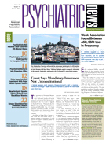Exposure to selective serotonin reuptake inhibitors (SSRIs), especially during the first trimester of pregnancy, may modestly increase the risk of a child developing an autism spectrum disorder (ASD).
That's the finding of a group of California-based researchers who recently performed a retrospective, population-based case-control study of 298 children with ASDs and their mothers and compared them with 1,507 randomly selected control children and their mothers. The study population was drawn from the membership of the Kaiser Permanente Medical Care Program in Northern California.
The research team, composed of members from Kaiser Permanente of Northern California, the Environmental Health Investigations Branch of the California Department of Public Health, and the Neuropsychiatric Institute and Hospital at the University of California at Los Angeles, sought to systematically evaluate whether prenatal exposure to antidepressant medications is associated with increased risk of ASD.
In their study group, 20 of the ASD-diagnosed children and 50 of the control children had a history of prenatal exposure to antidepressant medications. Statistical analysis determined there to be a twofold increased risk of ASD associated with treatment with SSRIs of the mother during the year before delivery, with the strongest effect associated with treatment during the first trimester. No increase in risk was found for children of mothers who had a history of mental illness treatment in the absence of prenatal exposure to SSRIs.
Lisa Croen, Ph.D., director of the Kaiser Permanente Autism Research Program and lead author of the study, and colleagues were careful to couch their findings in cautionary terms, lest readers jump too quickly to the conclusion that pregnant women should be denied SSRIs because of risk to the fetus. "The potential risk associated with exposure must be balanced with the risk to the mother or fetus of untreated mental health disorders," they said. "Further studies are needed to replicate and extend these findings."
Pat Levitt, Ph.D., director of the Zilkha Neurogenetic Institute at the Keck School of Medicine at the University of Southern California, discussed the findings—and their limitations reported by the study authors—in an editorial accompanying the publication: "Before embracing this as the newest causal factor ... the authors are careful to point out in a lengthy discussion the many caveats in their findings. They recognize that, given the history of [purported links between] ASD and environmental factors (immunizations, mercury), this type of report is likely to be overinterpreted by professionals and the public alike."
Levitt agreed that the neurobiological explanation for the findings of Croen and colleagues makes sense. "Perhaps it is a coincidence that the odds ratio for ASD risk in the study ... increases when first-trimester exposure to SSRIs is the sole factor. However, it is exactly that time of human brain development during which cortical and subcortical neuronal populations are being produced, migrating to their final destinations and beginning the long process of wiring. While much occurs later, the establishment of a strong foundation developmentally may be an essential component of healthy brain development."

